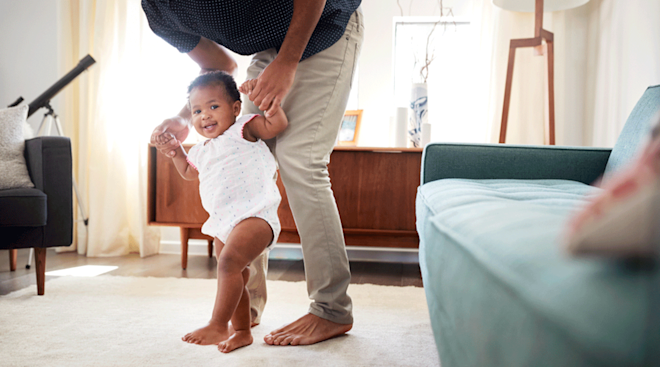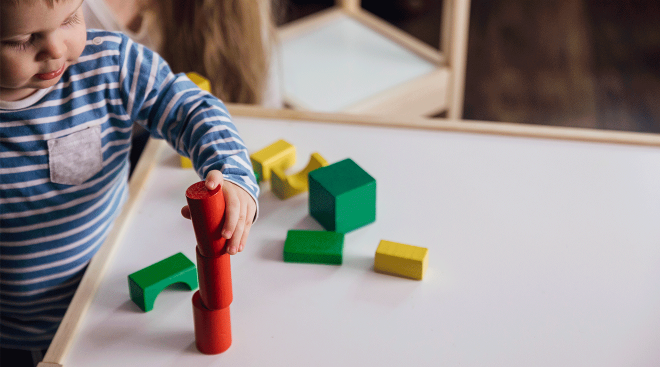Viral TikTok About the Need for Tummy Time Sparks Conversation
If you are a new parent, a soon-to-be parent or even just parent-adjacent, you’ve probably heard the phrase “tummy time.” Tummy time is pretty much exactly what it sounds like—time that baby spends on their stomach while awake and supervised. The idea is that placing baby on their tummy encourages them to lift their head, which helps strengthen their head, neck and shoulder muscles and boost motor skills.
Between multiple messages from pediatricians, parents and Momtokers reinforcing the importance of tummy time, it’s hard to miss this milestone. But one American mom, Patti Lynn, recently went viral after posting a TikTok suggesting that outside of the US, pediatricians don’t really emphasize the need for tummy time.
“I had multiple professionals being like, ‘You shouldn’t be putting your baby in uncomfortable positions, especially if they’re not already getting themselves into that position,’” Lynn said, recounting how the responses of French pediatricians who took care of her two children while her family lived abroad. “If they’re rolling over onto their tummy, that’s one thing, but putting them in positions that they aren’t able to get into naturally is developmentally inappropriate.”
The video, which now has over 279,000 views, sparked plenty of conversation, with parents from around the world chiming in that they indeed had never heard of tummy time or to the contrary, had heard of the concept reinforced abroad. Amid all of the back and forth some parents became increasingly confused as to whether tummy time was really important after all.
In response, pediatric physical therapist Dr. Bonnie Soto posted her own video to clear up the confusion, clarifying why tummy time might be talked about less outside of the US and why it’s still so important.
“If you live here in the United States, if you’ve been around my page for a while, you know that tummy time is a big thing and it is important, but I don’t think in the way that people understand,” Soto said. She goes on to explain that the push for tummy time in the US is most likely tied to America’s big “Back to Sleep/Safe to Sleep” campaign of the early 90s when parents were told to make sure their babies always slept on their backs to reduce the risk of Sudden Infant Death Syndrome (SIDS).
What proved to be very effective in reducing the risk of SIDS also may have led to parents “overcompensating, overreacting there too and not placing them on their bellies for play either, probably out of fear,” she explained. This uptick in keeping babies on their backs in led to a “huge increase in torticollis and plegeosephaly” or “flat head syndrome” and thus a big push for tummy time to remedy the problem. A push that you likely hear about consistently today.
In fact, the American Academy of Pediatrics currently recommends parents practice tummy time with their baby starting the day they come home from the hospital, two to three times a day for 3-5 minute periods.
Soto admits that all of the pressure around tummy time and parenting milestones, in general, can be exhausting, but there are easy ways to work this important time into your routine. “Roll into tummy time after a diaper change for a few minutes and you can sit and chit-chat with them,” she notes. “Your baby needs to snuggle you on your chest and take a nap, take a contact nap, get in the baby carrier, or just lay there and chit-chat in your face as you’re leaning back. Those are all part of a tummy time program.”
“Your baby needs free, unrestricted movement,” she added. “They need connection with you. You just holding your baby, snuggling them, moving them around in different positions is good for their development.”
When it comes to the suggestion that babies shouldn’t be put into any positions they can’t get themselves into, Soto finds the idea laughable. “Babies are entirely dependent on us for their positioning. So, this whole idea that we shouldn’t be putting them in positions that they can’t get into themselves… they can’t get into any positions by themselves. So, that’s baloney,” she adds.
Want to ensure baby is getting and enjoying the tummy time they need? Check out these six tips for successful tummy time from board-certified pediatricians.
Please note: The Bump and the materials and information it contains are not intended to, and do not constitute, medical or other health advice or diagnosis and should not be used as such. You should always consult with a qualified physician or health professional about your specific circumstances.
Navigate forward to interact with the calendar and select a date. Press the question mark key to get the keyboard shortcuts for changing dates.





















































